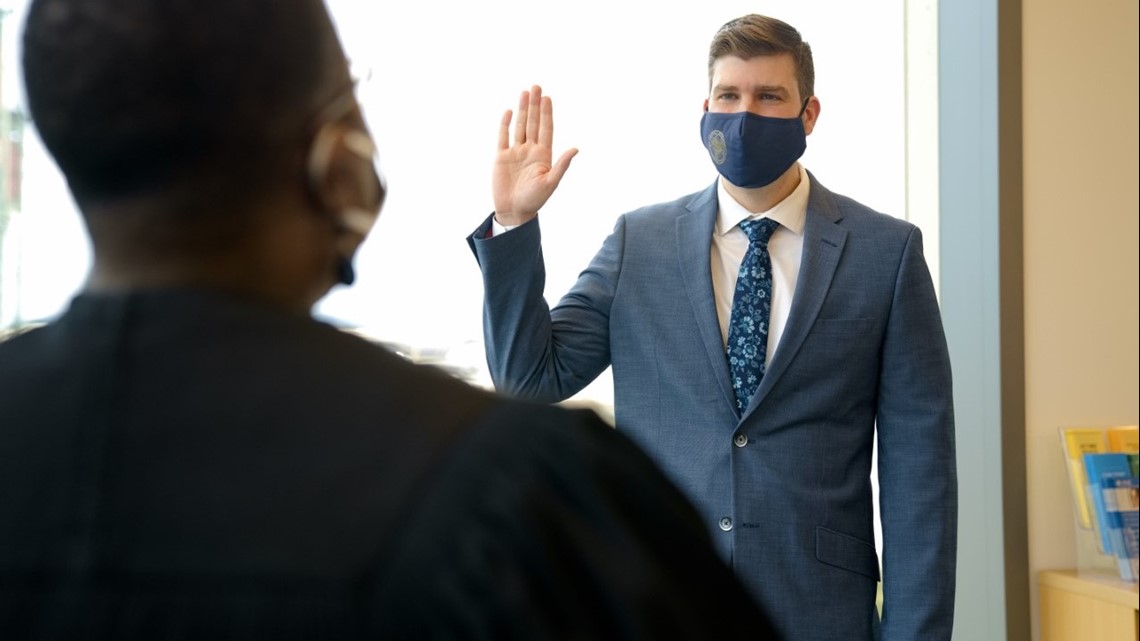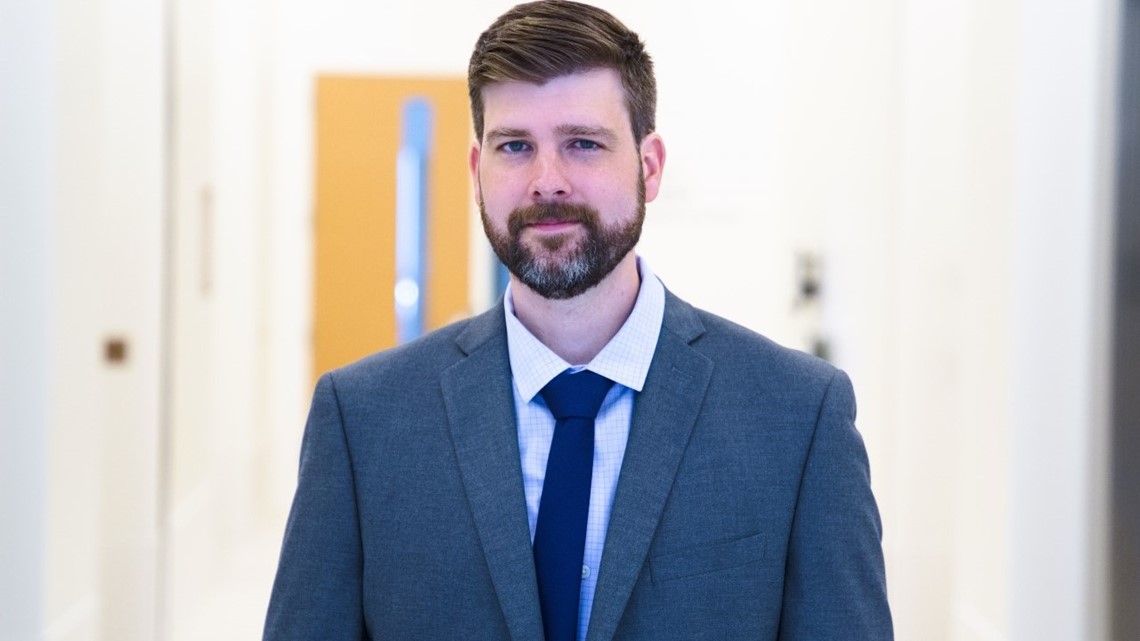PORTLAND, Ore. — After a rough start, Multnomah County's new district attorney Mike Schmidt has set his sights on fulfilling his campaign promise of criminal justice reform. In this week's episode of "Straight Talk," Schmidt reflected on his first six months in office, outlined some of his plans to change how his office works and defended how he's handled arrests during Portland's protests.
Rough start
It wasn't the start Schmidt was hoping for. After he was elected in an landslide with 77% of the vote in the May 2020 primary, Schmidt thought he'd have time to put together a transition team before being sworn into office in January 2021.
"I was looking forward to having the intervening six months to thoughtfully prepare what my first days in office would be like, what policies I could roll out," Schmidt said.
That's not exactly what happened. The district attorney at the time, Rod Underhill, announced he was retiring early. That meant Schmidt would take over months before he'd planned and during the peak of the Portland racial justice protests, some of which were violent.
"I got started Aug. 1 at the height of what was going on after the death of George Floyd and the protests, and hit the ground running," he said.


On the hot seat
When Schmidt took office protests in Portland had been ongoing for two months. He had 550 protest-related arrests waiting for his review. He said what they were doing had already failed, and what he decided to do with most of the growing number of arrests drew criticism.
"We put together a policy to focus on that small group of troublemakers... the people doing the harm and damage," he said.
That meant the vast majority of cases referred to his office by police were dismissed. Those low-level crimes included interfering with a police officer, criminal trespass, and disorderly conduct. Some saw the DA's policy as giving the green light to extremists on the left and the right that they wouldn't be held accountable. Schmidt acknowledged the messaging may have been misunderstood.
"I think the messaging was at a challenging moment on a lot of different levels ... you have to remember the climate we were in during a presidential election where the incumbent was trying to make Portland a centerpiece in his argument for why he should be reelected," Schmidt said. "I think there was a lot of confusion and misunderstanding ... But the policy was right. And I stand by that." (Story continues below)
On threats and being doxxed
Schmidt has been threatened for his approach to the protests, as have some other city leaders such as Mayor Ted Wheeler and Commissioners Jo Ann Hardesty and Dan Ryan. At one point, demonstrators showed up at Schmidt's house after he was doxxed; his address made public on a website.
"It's a disturbing trend that seems to be really spiking," Schmidt said. "Frankly, it's unnerving at times, especially for my family."
Schmidt thanked his neighbors for their support. They helped build a fence in front of his house.
"Just to create a space between the front door and the sidewalk to demarcate the area," he explained. "It gives us an extra layer of security."
As for the doxxing, there's some evidence a Portland police officer could be responsible for sharing Schmidt's address.
"What we know is it showed up in a website that cited the PPB as the source. Whether that's accurate, I don't know," Schmidt said.
He said the Portland Police Bureau's Internal Affairs division is looking into the matter, and said when he has talked to police officers and the union president, everyone agrees, the doxxing is not acceptable.
Transparency
Schmidt ran on a platform of transparency and has added a dashboard to the Multnomah County District Attorney's website so citizens can see exactly how many cases have been referred to his office, what the offenses are, how many have been dismissed and how many charged.
He said people can see they're focusing on the cases where people are doing harm and causing damage.
"The dashboard shows exactly what we've done," Schmidt said. "You know, I'm not hiding from it. I embrace it because I think it's exactly the right approach. It's not just rhetoric. You can go and see exactly where we are focusing our resources to make the community safer."
Restitution for businesses
When asked what his office's role might be in giving businesses confidence they can take plywood down from boarded up doors and windows, Schmidt said his office needs to make cases to hold the people accountable who are responsible for that damage.
"We need to get victims restitution," he said. "So that as they are putting their businesses back together, they have the resources they need to compensate them for the harm.”
Schmidt said his office is working with law enforcement to make those cases. Vandals hit dozens of businesses in the Hollywood and Hawthorne districts last November and Schmidt said his office is still in the process of collecting evidence and doing investigations to eventually prosecute those cases.


Addressing spike in gun violence: 'All hands on deck'
Schmidt has called addressing the surge in gun violence in Portland the most pressing safety issue the community faces. There were 103 shootings in the city in January of this year, double the number in January 2020.
"It really is an all hands on deck moment," he said.
Schmidt's office is working with the Portland Police Bureau, the Multnomah County Sheriff's Office, Gresham police, as well as the FBI and ATF to tackle the escalating violence. He said they have weekly reviews of the shooting incidents to share information and make sure they're not missing anything that might tie them together. He cited a report last week announcing his office had filed 26 gun violence related cases in the first 18 days of February.
"We are continuing at that clip and we are going to be holding people accountable," he said.
Prioritizing interventions to disrupt factors leading to violence
He said his office will also look for ways to make investments upstream to try to interrupt the cycle of violence.
"By the time we're involved in a case, the shooting has already happened," Schmidt said. "There is already a victim, or people have been traumatized by being shot at, if not hit, or unfortunately sometimes killed. That's too late. By the time it gets to us, we are too late."
He suggested meeting with people who might be involved in gun violence or likely to get involved. Meeting people who show up at the hospital who've been injured to see if there are ways to get them help and services they need.
"We need to do a better job to get as upstream as we can. By the time it gets to us, we are just putting the pieces back together," he said.
DA's office understaffed
Even before the current budget cycle, the Multnomah County District Attorney's Office had seen years of budget cuts. A 2020 MCDA report states its staffing levels are well below national standards. Add to that, this year the office faces cuts brought on by the pandemic.
Schmidt said his office just submitted its budget proposal to the county chair, who asked departments to submit options for 2% cuts. Schmidt said he has proposed some additions for investments in programs such as the Conviction Integrity Unit.
Conviction Integrity Unit
The Conviction Integrity Unit is part of Schmidt's overall plan to reform the criminal justice system and change how his office works. It's why he's asking for funding for staffing to beef up the unit, which will focus on those who have been wrongfully convicted or sentenced too harshly.
He said, typically, the prosecutor's office is involved with cases on the front end, reviewing police reports, determining charges, prosecuting and taking offenders through sentencing. After that, he said, they're pretty much done. He thinks that should change.
"I think we need to look more holistically at our system," Schmidt said. "You know, even with the best of intentions sometimes we make mistakes. There are tons of examples across the country, and even in the state of Oregon, where we made mistakes and got the wrong person in jail."
He wants his unit to review cases where mistakes might have been made, but to go beyond that and look at convictions that might have reason to be expunged. He cited a case on his desk of a Black man who was convicted of delivery of cocaine 25 years ago, and continues to run into barriers, even though he hasn't been involved in a crime since. Schmidt said the man can't get the case expunged because of the current laws.
"I'd like to see that changed," Schmidt said. "I think after 25 years of not being involved in the criminal justice system, what's the point of preventing him from getting housing, and loans, and all the benefits, jobs? There is no public safety reason for that."
Giving people behind bars the right to vote
Schmidt is supporting Oregon's Senate Bill 571 which would give convicted felons the right to vote while they're behind bars. As it stands now, they have to wait until they're finished serving their sentence.
"To me, this is a no-brainer," Schmidt said.
He said the research shows voting is a pro-social activity allowing people who would otherwise spend their time locked up to learn more about civics and exercise the right to vote. He said a study in Florida showed people who have the right to vote and exercise that right are less likely to commit future crimes.
"So, I think the question is -- why wouldn't we do it?" Schmidt asked.
He also said the laws that prevent people from voting, specifically Black people, have racist roots.
"There is just no public safety reason to prevent it. We are not going to be at any more risk because people vote," he said.
Push to repeal Measure 11
Schmidt is pushing the Oregon Legislature to repeal Measure 11, Oregon's mandatory minimum sentencing law. Oregon voters passed the measure in 1994. It requires mandatory minimum sentences for about two dozen crimes, including murder, serious cases of sex abuse, robbery and other violent offenses. Schmidt thinks judges should be given the flexibility to determine the sentences.
"They're in the position to hear arguments from the prosecution, hear arguments from the defense, and then listen to the victim," he said. "And they are in a neutral position, trusted in our community to make decisions like this all the time. They ought to also make the decisions in these serious crimes."
Hopeful about future
As Schmidt looks ahead to the future, he's hopeful. He said the community elected him overwhelmingly to change the way the criminal justice system works and he says that's what they're doing.
"Sometimes, it's small changes, but they can have big impacts," Schmidt said. "Looking at how we handle misdemeanors affects an enormous amount of people."
As the pandemic eases, he's ready to partner with people in the community to further his efforts to reform the system.
"To make sure we have one of the best criminal justice systems here in Multnomah County that we can have," Schmidt said.
Straight Talk airs Friday at 7 p.m., Saturday and Sunday at 6:30 p.m., and Monday at 4:30 a.m. Straight Talk is also available as a podcast.

